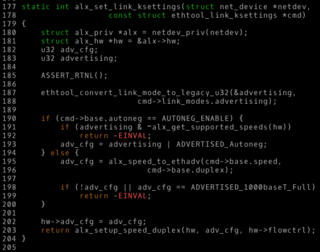An integrated development environment (IDE) is a software application that provides comprehensive facilities for software development. An IDE normally consists of at least a source-code editor, build automation tools, and a debugger. Some IDEs, such as IntelliJ IDEA, Eclipse and Lazarus contain the necessary compiler, interpreter or both; others, such as SharpDevelop and NetBeans, do not.

PostgreSQL, also known as Postgres, is a free and open-source relational database management system (RDBMS) emphasizing extensibility and SQL compliance. PostgreSQL features transactions with atomicity, consistency, isolation, durability (ACID) properties, automatically updatable views, materialized views, triggers, foreign keys, and stored procedures. It is supported on all major operating systems, including Linux, FreeBSD, OpenBSD, macOS, and Windows, and handles a range of workloads from single machines to data warehouses or web services with many concurrent users.
Structured Query Language (SQL) is a domain-specific language used to manage data, especially in a relational database management system (RDBMS). It is particularly useful in handling structured data, i.e., data incorporating relations among entities and variables.
A stored procedure is a subroutine available to applications that access a relational database management system (RDBMS). Such procedures are stored in the database data dictionary.

Free and Open source Software Developers' European Meeting (FOSDEM) is a non-commercial, volunteer-organized European event centered on free and open-source software development. It is aimed at developers and anyone interested in the free and open-source software movement. It aims to enable developers to meet and to promote the awareness and use of free and open-source software.
In computer science, the Boolean is a data type that has one of two possible values which is intended to represent the two truth values of logic and Boolean algebra. It is named after George Boole, who first defined an algebraic system of logic in the mid 19th century. The Boolean data type is primarily associated with conditional statements, which allow different actions by changing control flow depending on whether a programmer-specified Boolean condition evaluates to true or false. It is a special case of a more general logical data type—logic does not always need to be Boolean.
The following tables compare general and technical information for a number of relational database management systems. Please see the individual products' articles for further information. Unless otherwise specified in footnotes, comparisons are based on the stable versions without any add-ons, extensions or external programs.
In computing, a solution stack or software stack is a set of software subsystems or components needed to create a complete platform such that no additional software is needed to support applications. Applications are said to "run on" or "run on top of" the resulting platform.

LAMP is an acronym denoting one of the most common software stacks for the web's most popular applications. Its generic software stack model has largely interchangeable components.
PL/Perl is a procedural language supported by the PostgreSQL RDBMS.
Embedded SQL is a method of combining the computing power of a programming language and the database manipulation capabilities of SQL. Embedded SQL statements are SQL statements written inline with the program source code, of the host language. The embedded SQL statements are parsed by an embedded SQL preprocessor and replaced by host-language calls to a code library. The output from the preprocessor is then compiled by the host compiler. This allows programmers to embed SQL statements in programs written in any number of languages such as C/C++, COBOL and Fortran. This differs from SQL-derived programming languages that don't go through discrete preprocessors, such as PL/SQL and T-SQL.
This comparison of programming languages compares the features of language syntax (format) for over 50 computer programming languages.

In computer programming, a comment is a programmer-readable explanation or annotation in the source code of a computer program. They are added with the purpose of making the source code easier for humans to understand, and are generally ignored by compilers and interpreters. The syntax of comments in various programming languages varies considerably.
SQL/PSM is an ISO standard mainly defining an extension of SQL with a procedural language for use in stored procedures. Initially published in 1996 as an extension of SQL-92, SQL/PSM was later incorporated into the multi-part SQL:1999 standard, and has been part 4 of that standard since then, most recently in SQL:2023. The SQL:1999 part 4 covered less than the original PSM-96 because the SQL statements for defining, managing, and invoking routines were actually incorporated into part 2 SQL/Foundation, leaving only the procedural language itself as SQL/PSM. The SQL/PSM facilities are still optional as far as the SQL standard is concerned; most of them are grouped in Features P001-P008.
The null coalescing operator is a binary operator that is part of the syntax for a basic conditional expression in several programming languages, such as : C# since version 2.0, Dart since version 1.12.0, PHP since version 7.0.0., Perl since version 5.10 as logical defined-or, PowerShell since 7.0.0, and Swift as nil-coalescing operator.
SQL:1999 was the fourth revision of the SQL database query language. It introduced many new features, many of which required clarifications in the subsequent SQL:2003. In the meanwhile SQL:1999 is deprecated.
PL/SQL is Oracle Corporation's procedural extension for SQL and the Oracle relational database. PL/SQL is available in Oracle Database, Times Ten in-memory database, and IBM Db2. Oracle Corporation usually extends PL/SQL functionality with each successive release of the Oracle Database.

Snake case is the naming convention in which each space is replaced with an underscore (_) character, and words are written in lowercase. It is a commonly used naming convention in computing, for example for variable and subroutine names, and for filenames. One study has found that readers can recognize snake case values more quickly than camel case. However, "subjects were trained mainly in the underscore style", so the possibility of bias cannot be eliminated.





